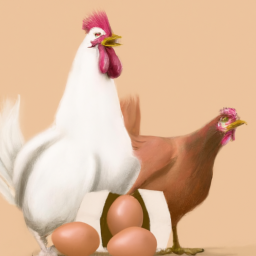Contrary to popular belief, hens do not require a rooster in order to lay eggs. This may come as a surprise to many, as the association between roosters and eggs is deeply ingrained in our collective consciousness. However, the reality is that hens are capable of laying eggs naturally, regardless of whether there is a rooster present or not.
Do Hens need a Rooster to lay Eggs?
The ability of hens to produce and lay eggs is primarily dependent on their overall health and receiving proper nutrition. As long as hens are well-fed and kept in good condition, they will continue to lay eggs consistently. This means that even in the absence of a rooster, hens will still lay eggs regularly.
It is important to note that the eggs laid by hens without a rooster will not be fertilized. This means that they will not develop into chicks. The process of fertilization occurs when a rooster mates with a hen, and the rooster’s sperm fertilizes the hen’s egg. Without this fertilization, the eggs laid by hens will remain unfertilized and will not hatch into baby chicks.
There are various reasons why some people prefer not to have a rooster in their flock. One of the main concerns is the noise that roosters can generate. Roosters are notorious for their early morning crowing, which can disturb the peace and tranquility of a neighborhood. This can be a significant issue for urban or suburban chicken keepers who are keen on maintaining good relations with their neighbors.
Additionally, roosters can sometimes display aggressive behavior towards other chickens. This aggression can lead to injuries among the flock, as roosters may engage in fights or pecking order disputes. Some chicken owners prefer to avoid this potential risk by not having a rooster in their flock.

However, it is worth noting that having a rooster in the flock can also be beneficial in various ways. Roosters often act as protectors for the hens, alerting them to potential dangers and defending them against predators. They also play a vital role in establishing a social hierarchy within the flock, ensuring that each chicken knows its place. This hierarchy helps maintain order and reduces the likelihood of conflicts among the chickens.
Furthermore, having a rooster in the flock may potentially increase egg production. Some chicken keepers believe that the presence of a rooster can stimulate hens to lay more eggs. While this claim is not scientifically proven, many anecdotal reports from chicken owners support this theory.
They will naturally lay eggs as long as they are healthy and receiving proper nutrition. The eggs produced by hens without a rooster will not be fertilized and will not develop into chicks. However, whether or not to have a rooster in the flock is a personal choice for chicken owners. It depends on factors such as noise concerns, potential aggression, and the desire for added protection and social hierarchy.
Conclusion
- Hens can lay eggs without a rooster present
- Egg production is dependent on the health and nutrition of the hens
- Eggs laid without a rooster will not be fertilized and will not hatch into chicks
- Some people prefer not to have a rooster due to noise concerns and potential aggression
- Roosters can act as protectors and establish a social hierarchy within the flock
- Having a rooster may potentially increase egg production, although this is not scientifically proven
Thank You for Visiting our website mhnrc.org. If you liked the article, then share it with others.
Follow us on Facebook


